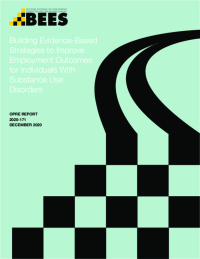Building Evidence-Based Strategies to Improve Employment Outcomes for Individuals With Substance Use Disorders

 This paper examines the impetus and existing evidence on programs that integrate employment services with treatment and recovery services for people with opioid and other substance use disorders. It includes an overview of the nature and recent history of substance use disorders and their treatment, including the important role that employment can play in recovery, and discusses the factors that historically limited the role of employment services in treatment programs. It also provides a brief review of the limited but promising evidence on the effectiveness of integrating substance use disorder treatment and employment services in improving participants’ employment outcomes.
This paper examines the impetus and existing evidence on programs that integrate employment services with treatment and recovery services for people with opioid and other substance use disorders. It includes an overview of the nature and recent history of substance use disorders and their treatment, including the important role that employment can play in recovery, and discusses the factors that historically limited the role of employment services in treatment programs. It also provides a brief review of the limited but promising evidence on the effectiveness of integrating substance use disorder treatment and employment services in improving participants’ employment outcomes.
The Building Evidence on Employment Strategies for Low-Income Families (BEES) project studies programs that combine employment services with substance use disorder treatment and recovery services. It is funded by the Office of Planning, Research, and Evaluation within the Administration for Children and Families. Through a series of rigorous evaluations, BEES aims to increase the understanding of effective interventions that help low-income individuals find jobs and advance in the labor market.






